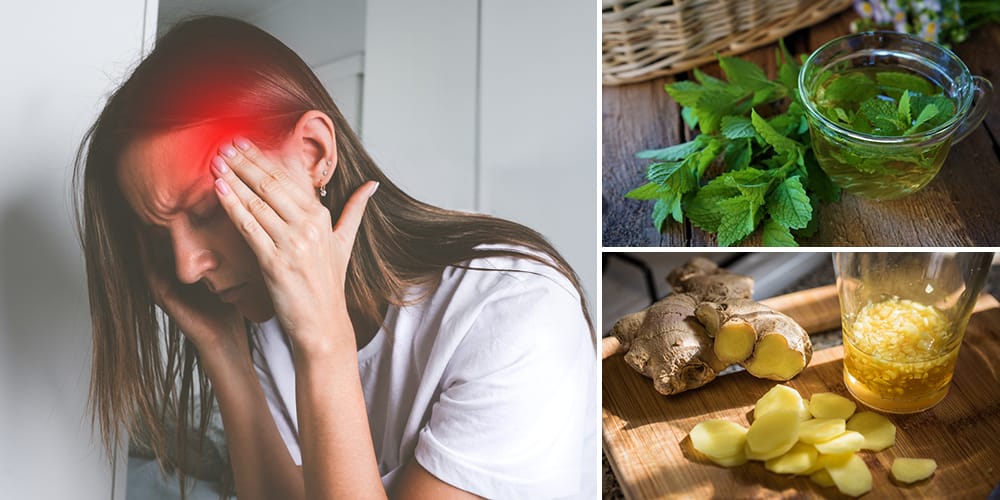
The Ultimate Migraine Relief
Migraine headaches are complex and each of us may experience them differently. The symptoms of a migraine attack vary from a nagging headache to nausea, vomiting, blurred vision, and photosensitivity. There are also different triggers and their durations are unpredictable.
Regardless of the cause, all you want is immediate relief.
Many of us may find comfort in topicals and liniments. Applying a cold pack like a frozen bag of beans on the head and neck has worked wonders for migraines, although temporarily. If the migraine comes with bouts of nausea, a nice warm cup of tea can provide a pleasant relief.
Common Causes of Migraines
Migraines are characterized by severe and throbbing head pain, often occurring only on one side of the head. In some people, warning signs like aura will occur before the pain. An aura is a visual disturbance like flashes of light or blind spots.
A tingling of the arm or leg, and even difficulty speaking may also happen before the migraine sets in.

Migraine stems from different causes such as:
- Hormonal problems
- Stress and emotional triggers
- Hunger and dehydration
- Poor diet and nutrition
- Prolonged screen time
- Low blood sugar
- Environmental triggers (light and noise)
- Certain food products (caffeine, chocolate, peanut butter, dairy products, etc.)
Stress and anxiety are one of the most common causes of headaches and migraines. The interconnected relationship between anxiety, stress, and headaches is well-documented, as the body’s response to stress can lead to muscle tension and vascular changes, culminating in painful migraine episodes or tension headaches.
I am currently taking this Anxiety & Stress Tincture and it’s showing good results for me. I purchased it from Nicole’s Apothecary shop.
This herbal blend of Ashwagandha, Lemon Balm, Lion’s Mane & Reishi Mushroom aids the body in adapting to stressors, soothing the nervous system, and alleviating symptoms of anxiety, depression, and stress-induced insomnia. It’s suitable for up to 3 daily uses, including nighttime use for those plagued by anxious thoughts. For those seeking a natural solution to their sleeping problems, I recommend checking out the Sleep Blend Tincture.
Remedies for Migraines
Migraines can happen to anyone: children, teenagers, adults, seniors. Lifestyle changes can do so much to provide a long-term cure. If you need temporary relief right away, several self-help remedies may work.
Maintaining a regular sleep-wake cycle, reducing stress and triggers, being physically active, and trying the following herbal remedies may also help with migraines.
Feverfew: Feverfew (Tanacetum parthenium) is an excellent remedy for migraine headaches. It is a general pain reliever that reduces all sorts of body pain. Its analgesic property is due to the chemical compound parthenolide that tones the pain-sensitive cerebral blood vessels. For nagging migraine pain, just chew a couple of fresh leaves. If fresh is not an option, you can buy dried feverfew leaves and take its decoction twice a day.
Chamomile: A cup of chamomile (Matricaria chamomilla) every night before bedtime can induce a good sleep. If you are well-rested, it reduces the chance of migraine attacks. Chamomile is also an anti-inflammatory herb that reduces the inflammation of the blood vessels that may be causing the pain.
Yarrow: Yarrow (Achillea millefolium) is a wonderful tonic for healing the body. It is traditionally used for treating nosebleeds, fever, headaches and other inflammations. Yarrow leaves can also provide instant relief for severe migraines and ease the dizziness, twitching and constriction in the head. There are different ways of taking yarrow such as infusion or tea, capsule or tablet. But, it is most effective when taken in its tincture form.
Lavender: When it comes to excruciating head pain, lavender oil is a go-to topical remedy. Inhaling its scent alone is enough to reduce the pain, relieve stress and induce relaxation. If you have a blinding migraine headache, mix a few drops of lavender oil and mix it into a carrier oil like coconut, almond or jojoba oil. Adding a few drops of peppermint also adds a cooling and refreshing scent. Apply the mixture liberally on the temple, forehead, scalp, nape and neck area. Rest and relax.
For all the above mentioned plants you can find good quality, non-GMO seeds right here.
Ginger: Ginger tea is a traditional herbal beverage for various health problems like respiratory and digestive issues. Ginger (Zingiber officinale) is also a very effective analgesic and anti-inflammatory herb. For migraine headaches, just sip a warm tea made from fresh ginger rhizome. You can also grind the rhizome and apply it directly as a poultice on the forehead.
Peppermint: Peppermint essential oil is widely used for managing many types of pain that occur anywhere else in the body. Its fresh menthol feel and scent may help lift the burden out of throbbing headaches. Taking an infusion of peppermint leaves twice a day can also tame migraine pain and ease the nausea associated with it.
Rosemary: Rosemary (Rosmarinus officinalis) possesses anti-inflammatory and antispasmodic properties. It releases tension in the blood vessels to improve blood flow and ease pains and headaches. Rosemary is best used topically as essential oil or inhaled as aromatherapy to alleviate migraines. Dried rosemary leaves also make a potent tea to take during a migraine attack.
Basil: Basil (Ocimum basilicum) is one of the important herbs that you need to have in your garden for its variety of uses. It reduces stress and anxiety, as well as prevents food poisoning. Basil also provides a quick relief for migraines and stops the nausea and vomiting that come with it. The best way of taking it is by drying its leaves until crumbly and grinding it into powder. Mix a teaspoon of this powder with honey and take it on an empty stomach to treat the headache and nausea.
Garlic: Garlic (Allium sativum) is also one of the handiest migraine relief spices you can easily find in your kitchen. It is a very effective analgesic that acts as a natural painkiller. Garlic contains allicin that can thin the blood and dilate the blood vessels to release nerve tension and reduce head pain.
Cloves: Clove (Syzygium aromaticum) is one of the most potent analgesic herbal remedies. It is widely used for tooth and mouth problems but also makes an excellent home remedy for migraines. Clove oil inhibits pain when applied topically and clove infusions alleviate numbing headaches when taken internally.
DIY Migraine Relief Remedy
OTC medicines are surely effective against migraine. The problem with them is the rebound headache that they may trigger. Rebound headaches are headaches that arise from the overuse of migraine medicines.
Here is one simple and trusted solution for migraine that you can easily prepare at home with readily available ingredients.
For this recipe, I am using fresh ginger rhizome and dried peppermint.
Ginger and peppermint tea is safe when taken in a moderate amount. Avoid taking large doses, especially while taking blood thinning agents since ginger may interfere with the medication. It is also not advisable for treating migraines associated with diabetes.
Ingredients:
- 1-inch ginger root, roughly chopped
- 1 tsp shredded peppermint leaves
- a cup of water
- Honey, to taste
Steps:
- Infuse the ginger root and peppermint leaves by boiling them in a cup of water for about 5 minutes.

- Pour the infusion in a cup. Let it cool a bit.

- Stir in honey before drinking or take the tea as it is.

How to Use
Take the ginger-peppermint tea twice a day. You can take it warm or cold by adding a few ice cubes, but it depends on your preference. Some people do not tolerate cold drinks during migraine attacks while others may find relief in it.

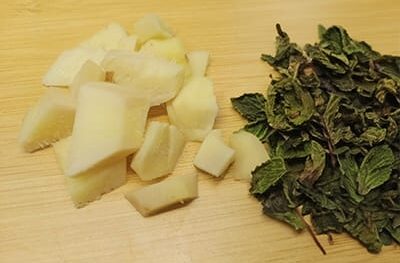
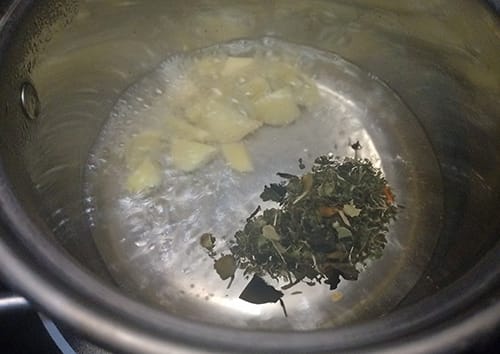
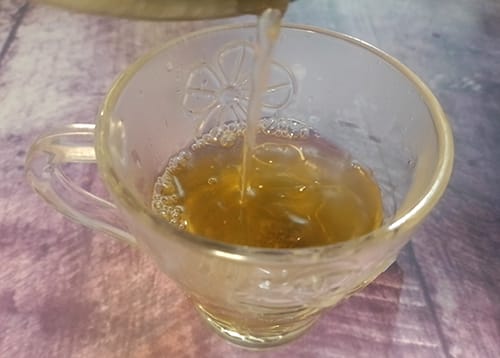
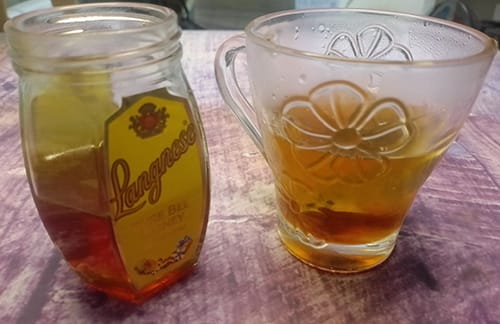
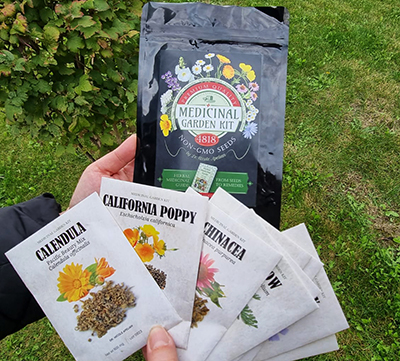
MSG Monosodium Glutamate – gives me the WORST Migraines ever! Crosses the BBB Blood Brain Barrier! Read your labels! (sometimes hidden as spices) if in doubt don’t eat or please don not buy the product.
Can you make a migraine capsule out of any of these herbs? This would be great for traveling. When making a tea is not convenient.